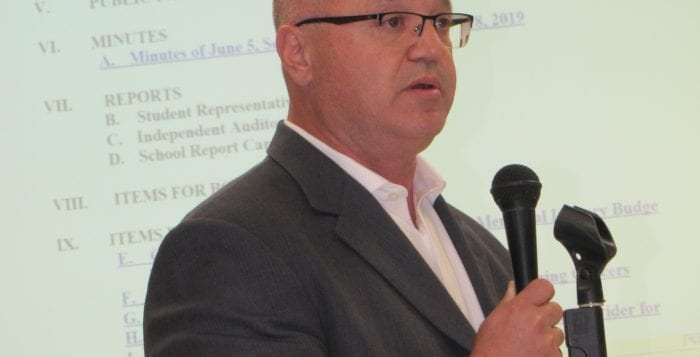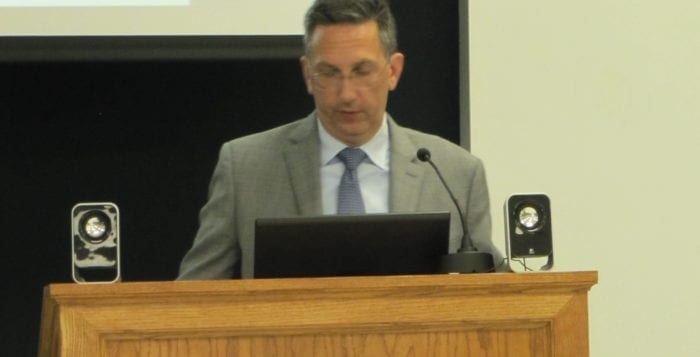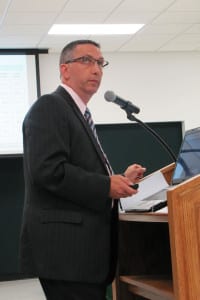A new superintendent will be overseeing the Three Village Central School district come July 6.

TVCSD’s assistant superintendent for educational services, Kevin Scanlon, is ready to take over the reins with nearly 30 years of education experience behind him.
Last year, current superintendent Cheryl Pedisich’s announcement that she would stay on for one more school year coincided with Scanlon receiving offers from other districts. After the board of ed reviewed his résumé and interviewed him, they asked if he wanted the job. He said in a phone interview that after enjoying his work immensely in Three Village over the years, “I’m going to be happy to continue on in my new role.”
Background
The 52-year-old lives a short distance away in Smithtown, and he and his wife Kerri have two children, Meghan, 25, and Sean, 14. A native of Bay Shore, he grew up as the youngest of 11 children and began his college career at first majoring in accounting at Iona College. He soon switched to history, with a concentration on middle eastern history. Scanlon went on to get his master’s in criminal justice at the school and was employed by the college as an admissions counselor and then managed the dorms. He recently received his doctorate from St. John’s University and has an administration certification from Stony Brook University.
His interest in teaching grew when he was in college tutoring underprivileged students. He said that’s when “chalk got in my blood.”
“I felt I would do more for our world in general if I was working with kids like that,” Scanlon said.
Throughout his career, he’s taught social studies at every level from seventh grade to 12th, including Advanced Placement, honors and Regents classes.
“I’ve enjoyed that immensely,” he said. “I see so much of the good that our teachers do and teachers in general do, just affecting the future.”
His first teaching job was in a school in Upper Manhattan that saw an increase in crime right in its own hallways in the late 1980s and ’90s. The former amateur boxer, who spent eight years in the U.S. Navy Reserve, was conducting a student observation when he had to tackle a student with a knife in the hallway.
“The next morning, I was brought in to replace the teacher that was stabbed,” Scanlon said. “A little frightening, but well needed in that place. It was a very large high school in Upper Manhattan, 4,000 students. They set the state record for robberies and rapes in a school.”
After working in the New York City school system, he went on to teach Catholic school for a short period in Connecticut. He also has taught night school in Brentwood High School for 10 years.
His first experience teaching in Three Village was in 1996 when he became a social studies teacher in Ward Melville High School, five years later he became chair of humanities at Paul J. Gelinas Junior High School and remained in the position until 2003.
He had a two-year stint in the Oyster Bay school district as district supervisor of social studies and became principal of Roslyn High School in 2005 after a scandal in the district which is the subject of the movie “Bad Education.” After spending seven years heading up Roslyn, he returned to Three Village in 2012 as assistant superintendent for educational services.
The future
Scanlon said he is ready to work on some significant challenges when he begins his new position July 6. He said before the pandemic parents had been discussing school start times with the board and administrators. Many have said that some students, particularly high school students, have first classes that start too early and interfere with healthy sleeping patterns for teenagers. A start-time committee was formed before the pandemic, but discussions had to be put on hold as administrators dealt with COVID-19.
“We’ve had discussions on time and things of that nature, but we’re going to need to address some of that moving forward and involve all the constituencies in the district in that discussion,” he said. “Whether we do reconfigure or we stay in our current configuration, I think we need to at least discuss what that would look like going forward,” adding that things may not change drastically, but a closer look needs to be taken at the issue.
Scanlon also feels that divisiveness in the nation has carried over locally.
“We want to try to heal the community as much as possible, and I think what will go a long way is continuing to be as transparent as possible,” he said.
One way Scanlon said that can be done is using social media more often to supplement the district’s website. He said it also ensures that the community is getting their information from the district itself, especially when it comes to matters such as the budget. The future superintendent said social media is also a way to “be open to listening to some of the differing opinions that exist in the district and try to make the best decisions possible for the students that we have.”
“I want to make sure that as we do move forward that we have people understand about what we’re trying to do, and improvements we are trying to make and planning for our future, but also involving all our parents, our community members, our students, our faculty, our administration, in those decisions as we go forward,” he said.
Scanlon added that Pedisich has always been open to parents, returning emails and phone calls, and he will miss how deeply she cares about the community. He said he’s happy he was able to work with her for the last 10 years. Scanlon said she approached every issue with a calm attitude and is “a real model to emulate.”
While he will miss working with Pedisich, he’s proud to take on his new role in the district.
“I’m truly honored to be in this role,” Scanlon said. “I’m going to work my hardest for the benefit of the students and the families and the staff.”










